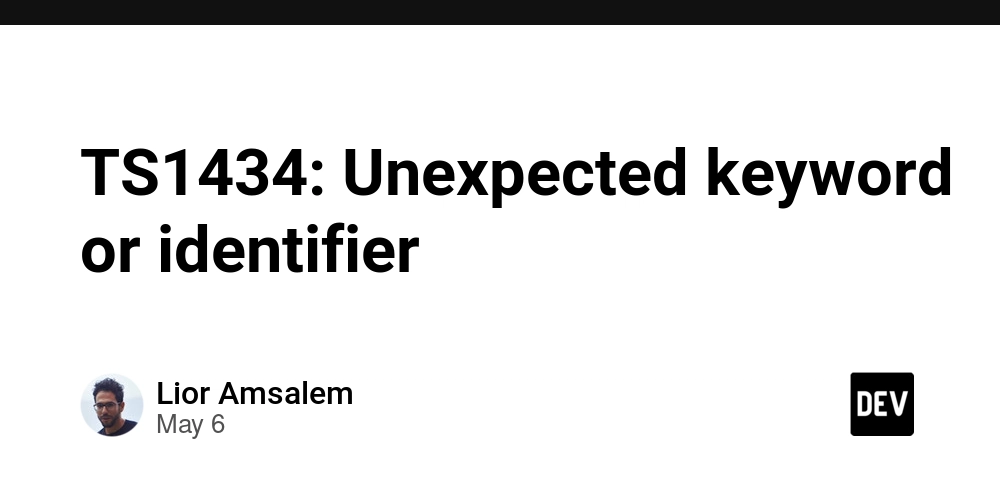TS1434: Unexpected keyword or identifier
TS1434: Unexpected keyword or identifier TypeScript is a strongly typed programming language that builds on JavaScript, adding static types to the language. It is often referred to as a superset of JavaScript because it includes everything JavaScript offers while introducing additional features such as types, interfaces, and enums, which help developers catch errors at compile time rather than runtime. In TypeScript, "types" are a mechanism to define the shape, structure, or behavior of data in your programs, ensuring that your code operates exactly as intended. If you're interested in understanding and mastering TypeScript—or using AI tools to streamline your learning—consider subscribing to our blog. Additionally, tools like GPTeach can be a great way to learn coding concepts faster and more interactively. This article focuses on the common TypeScript error TS1434: Unexpected keyword or identifier—what it means, why it occurs, and, more importantly, how you can fix it. We'll also explore what enums are, since understanding them will clarify why this type of error happens. What Are Enums in TypeScript? Before we dive into TS1434: Unexpected keyword or identifier, let's briefly discuss enums. Enums (short for "enumerations") are special types in TypeScript that enable developers to define a set of named constants. Enums provide a way to organize and name related values, making your code more readable and less prone to mistakes caused by magic numbers or string literals. Here’s a simple example of an enum: enum Direction { North, East, South, West, } In the above code, Direction is an enum that defines four possible values: North, East, South, and West. These values are automatically assigned numeric indexes starting from 0, so Direction.North is 0, Direction.East is 1, and so on. You can also assign custom values if desired. Enums are enormously useful, but like any feature in a programming language, incorrect usage can trigger errors like TS1434: Unexpected keyword or identifier. What Does TS1434: Unexpected keyword or identifier Mean? The error TS1434: Unexpected keyword or identifier typically occurs when TypeScript encounters a piece of code where it doesn’t recognize a keyword, identifier (variable or function name), or symbol in the correct context. This error commonly arises due to: Incorrect type definitions. Syntax mistakes in enums, interfaces, or type declarations. Use of reserved words as variable or type names. Improperly structured code. In simpler terms, TS1434: Unexpected keyword or identifier means TypeScript found something in your code that doesn't belong—either a typo, mishandled syntax, or use of a restricted term. Code Example: What Causes TS1434: Unexpected keyword or identifier? Here’s a piece of code that triggers this error: enum Status { Active, Inactive, "Pending", } At first glance, this code looks fine. However, it contains an error. Why? Because enums do not allow string literals ("") as keys. The use of quotes around Pending violates the syntax rules, triggering the error TS1434: Unexpected keyword or identifier. To fix this issue, you simply need to remove the quotes: enum Status { Active, Inactive, Pending, } Another Common Example: Type Misuse Here’s another situation that results in TS1434: Unexpected keyword or identifier: type User = { name: string, age: number, isAdmin: Function }; In this code, Function is being used as a type, but it’s too generic and often considered misleading. TypeScript expects specific function types. Fixing this involves specifying the function’s parameter and return types: type User = { name: string, age: number, isAdmin: () => boolean }; FAQ's About TS1434: Unexpected keyword or identifier 1. Can TS1434 occur with interfaces? Yes. For example, the following code will trigger the error: interface Item { id: number, name: string: } Notice the colon (:) after string. This is a syntax error. Fix it by replacing the colon with a semicolon (;): interface Item { id: number; name: string; } 2. Why does TS1434 occur with enums? Enums come with strict rules regarding how they are declared. Common mistakes that can trigger TS1434: Unexpected keyword or identifier include: Using string keys (e.g., "Pending" instead of Pending). Assigning invalid values as enum members (e.g., Active: "on" without proper type alignment). 3. How does TypeScript protect against TS1434? TypeScript’s type-checking system proactively identifies problematic code during compile time. This ensures that errors like spelling mistakes, invalid syntax, or misused keywords appear as soon as possible instead of causing issues at runtime. Important to Know: Reserved Words When dealing with TS1434: Unexpected keyword or identifier, remember tha

TS1434: Unexpected keyword or identifier
TypeScript is a strongly typed programming language that builds on JavaScript, adding static types to the language. It is often referred to as a superset of JavaScript because it includes everything JavaScript offers while introducing additional features such as types, interfaces, and enums, which help developers catch errors at compile time rather than runtime. In TypeScript, "types" are a mechanism to define the shape, structure, or behavior of data in your programs, ensuring that your code operates exactly as intended.
If you're interested in understanding and mastering TypeScript—or using AI tools to streamline your learning—consider subscribing to our blog. Additionally, tools like GPTeach can be a great way to learn coding concepts faster and more interactively.
This article focuses on the common TypeScript error TS1434: Unexpected keyword or identifier—what it means, why it occurs, and, more importantly, how you can fix it. We'll also explore what enums are, since understanding them will clarify why this type of error happens.
What Are Enums in TypeScript?
Before we dive into TS1434: Unexpected keyword or identifier, let's briefly discuss enums. Enums (short for "enumerations") are special types in TypeScript that enable developers to define a set of named constants. Enums provide a way to organize and name related values, making your code more readable and less prone to mistakes caused by magic numbers or string literals.
Here’s a simple example of an enum:
enum Direction {
North,
East,
South,
West,
}
In the above code, Direction is an enum that defines four possible values: North, East, South, and West. These values are automatically assigned numeric indexes starting from 0, so Direction.North is 0, Direction.East is 1, and so on. You can also assign custom values if desired.
Enums are enormously useful, but like any feature in a programming language, incorrect usage can trigger errors like TS1434: Unexpected keyword or identifier.
What Does TS1434: Unexpected keyword or identifier Mean?
The error TS1434: Unexpected keyword or identifier typically occurs when TypeScript encounters a piece of code where it doesn’t recognize a keyword, identifier (variable or function name), or symbol in the correct context. This error commonly arises due to:
- Incorrect type definitions.
- Syntax mistakes in enums, interfaces, or type declarations.
- Use of reserved words as variable or type names.
- Improperly structured code.
In simpler terms, TS1434: Unexpected keyword or identifier means TypeScript found something in your code that doesn't belong—either a typo, mishandled syntax, or use of a restricted term.
Code Example: What Causes TS1434: Unexpected keyword or identifier?
Here’s a piece of code that triggers this error:
enum Status {
Active,
Inactive,
"Pending",
}
At first glance, this code looks fine. However, it contains an error. Why? Because enums do not allow string literals ("") as keys. The use of quotes around Pending violates the syntax rules, triggering the error TS1434: Unexpected keyword or identifier.
To fix this issue, you simply need to remove the quotes:
enum Status {
Active,
Inactive,
Pending,
}
Another Common Example: Type Misuse
Here’s another situation that results in TS1434: Unexpected keyword or identifier:
type User = {
name: string,
age: number,
isAdmin: Function
};
In this code, Function is being used as a type, but it’s too generic and often considered misleading. TypeScript expects specific function types. Fixing this involves specifying the function’s parameter and return types:
type User = {
name: string,
age: number,
isAdmin: () => boolean
};
FAQ's About TS1434: Unexpected keyword or identifier
1. Can TS1434 occur with interfaces?
Yes. For example, the following code will trigger the error:
interface Item {
id: number,
name: string:
}
Notice the colon (:) after string. This is a syntax error. Fix it by replacing the colon with a semicolon (;):
interface Item {
id: number;
name: string;
}
2. Why does TS1434 occur with enums?
Enums come with strict rules regarding how they are declared. Common mistakes that can trigger TS1434: Unexpected keyword or identifier include:
- Using string keys (e.g.,
"Pending"instead ofPending). - Assigning invalid values as enum members (e.g.,
Active: "on"without proper type alignment).
3. How does TypeScript protect against TS1434?
TypeScript’s type-checking system proactively identifies problematic code during compile time. This ensures that errors like spelling mistakes, invalid syntax, or misused keywords appear as soon as possible instead of causing issues at runtime.
Important to Know: Reserved Words
When dealing with TS1434: Unexpected keyword or identifier, remember that you cannot use reserved words in TypeScript as variable or type names. Examples of reserved words include class, function, null, enum, and others.
Here’s an example that causes this error:
let enum: string = "hello";
To fix this, use a non-reserved word, such as:
let category: string = "hello";
Key Takeaways to Solve TS1434
- Check your enums for invalid syntax, such as string keys or improperly assigned values.
- Review type definitions for typos and missing or misused characters.
- Avoid reserved words when naming variables, functions, or types.
- Use specific function signatures, not generic
Functiontypes. - Always double-check your syntax when working with interfaces, types, or enums.
Important to Know: Use TypeScript's Compiler
The TypeScript compiler (tsc) provides clear feedback when TS1434 occurs. You can use tsc --watch to check for real-time errors, helping you catch issues like TS1434: Unexpected keyword or identifier as you write your code.
By understanding the root causes of TS1434: Unexpected keyword or identifier, you drastically reduce the likelihood of running into this error. With TypeScript's powerful features like enums, types, and interfaces, you can write safer, more reliable code. And remember—taking the time to master these core concepts will save you hours of debugging in the long run! If you’re ready to learn more, be sure to check out tools like GPTeach to boost your coding skills effectively.







































































































































































![[The AI Show Episode 146]: Rise of “AI-First” Companies, AI Job Disruption, GPT-4o Update Gets Rolled Back, How Big Consulting Firms Use AI, and Meta AI App](https://www.marketingaiinstitute.com/hubfs/ep%20146%20cover.png)









































































































































































































































































_Alexey_Kotelnikov_Alamy.jpg?width=1280&auto=webp&quality=80&disable=upscale#)
_Brian_Jackson_Alamy.jpg?width=1280&auto=webp&quality=80&disable=upscale#)






























































































![iPhone spyware company NSO must pay Meta $167M for WhatsApp attack [U]](https://i0.wp.com/9to5mac.com/wp-content/uploads/sites/6/2024/03/iPhone-spyware-company-NSO-must-reveal-code.jpg?resize=1200%2C628&quality=82&strip=all&ssl=1)


![Roku clarifies how ‘Pause Ads’ work amid issues with some HDR content [U]](https://i0.wp.com/9to5google.com/wp-content/uploads/sites/4/2025/05/roku-pause-ad-1.jpg?resize=1200%2C628&quality=82&strip=all&ssl=1)














![Apple Seeds visionOS 2.5 RC to Developers [Download]](https://www.iclarified.com/images/news/97240/97240/97240-640.jpg)
![Apple Seeds tvOS 18.5 RC to Developers [Download]](https://www.iclarified.com/images/news/97243/97243/97243-640.jpg)



























































































